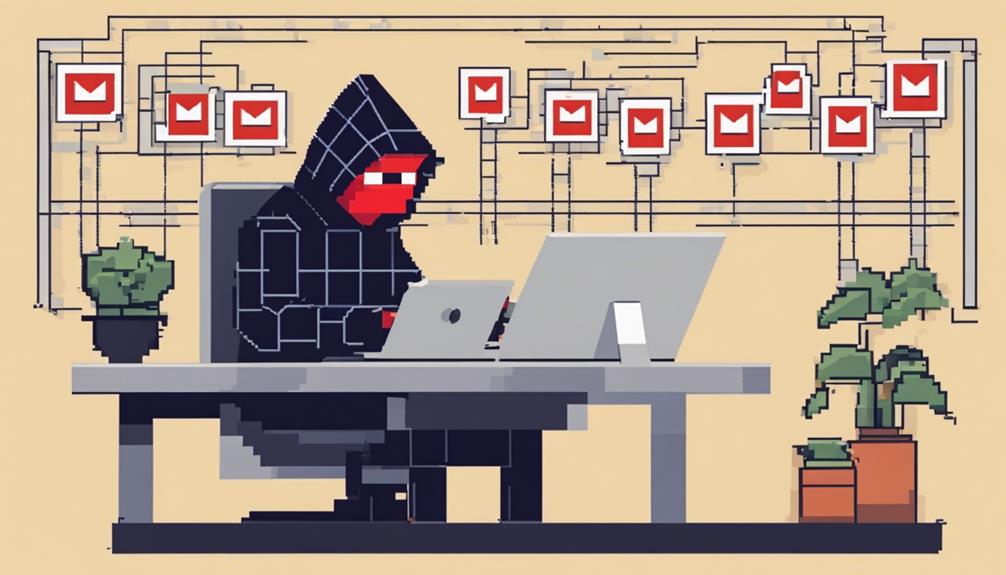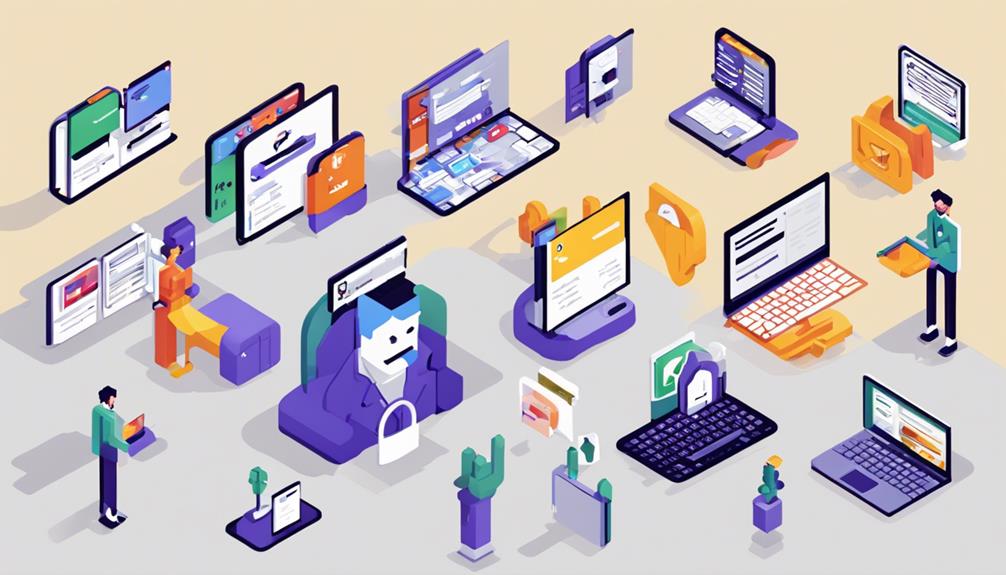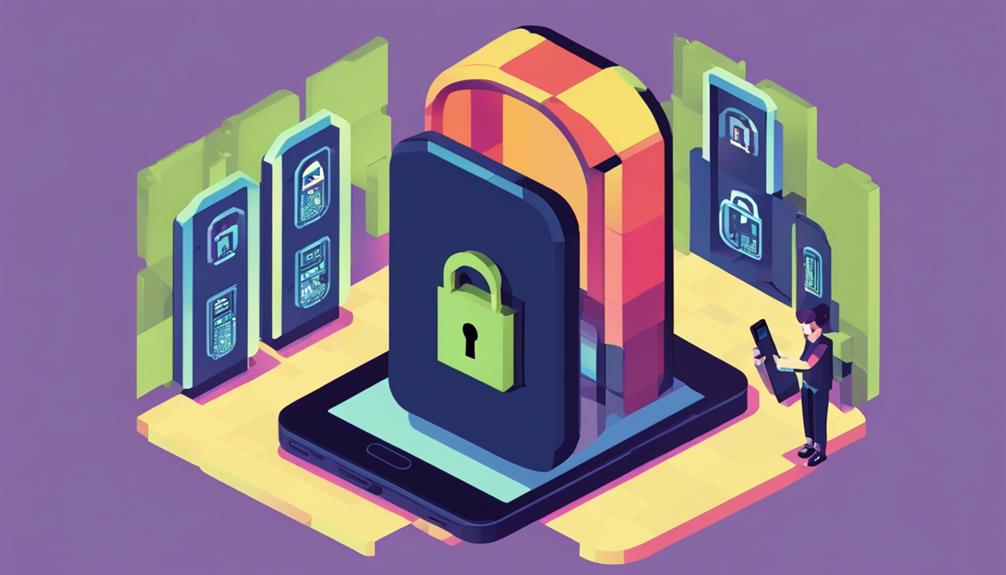Gmail is generally secure with TLS encryption for data transfer and 128-bit encryption at rest. Two-factor authentication adds an important extra layer of protection. Recognizing phishing attacks is key, as they are a common hacker tactic. Email encryption is essential for safeguarding sensitive information. Regular security checkups and strong passwords are recommended. Identifying suspicious activity like unrecognized logins is essential. Using a VPN on public Wi-Fi can enhance security. Exploring alternative email providers for added protection is worth considering. For a more in-depth understanding of securing Gmail against hackers, further details are available in the provided information.
Key Takeaways
- Enable Gmail's 2FA for added security against unauthorized access.
- Use strong, unique passwords and avoid sharing personal information.
- Regularly review account activity and enable security alerts.
- Consider email encryption to safeguard sensitive information.
- Be cautious on public Wi-Fi, use VPN, and explore secure email alternatives.
Gmail Security Measures
When considering Gmail security measures, it is crucial to understand the encryption protocols and data handling practices implemented by Google. Gmail employs TLS encryption for data transfer and 128-bit encryption for data at rest, guaranteeing that your emails are protected during transmission and storage.
However, it is essential to note that Google scans emails for data collection purposes, and in the past, partners have had access to users' Gmail accounts.
To enhance Gmail security, users are advised to prioritize stronger encryption methods. This includes securing your Gmail account with strong passwords and enabling 2-factor authentication.
By implementing these security measures, you can greatly reduce the risk of unauthorized access to your emails and ensure that your communication remains private and secure.
Stay vigilant and proactive in safeguarding your Gmail account to protect your sensitive information from potential threats.
Strong Email Passwords

Considering the pivotal role that strong passwords play in safeguarding email security, it is vital to prioritize the creation of robust and unique passwords for your Gmail account. Strong passwords should consist of at least 20 random characters to enhance security and deter potential hackers.
It is essential to avoid using personal information, such as names or birthdates, in your passwords, as this makes them easier to guess. Instead, opt for passphrases that combine random words or phrases to create a strong and memorable password.
Password managers can be valuable tools in generating and storing complex passwords for your Gmail account securely. These tools help reduce the risk of password reuse across multiple accounts, further enhancing your email security.
Two-Factor Authentication Setup

Implementing two-factor authentication (2FA) for your Gmail account enhances security by adding an additional layer of protection to prevent unauthorized access. Google provides various options for setting up 2FA, including authenticator apps, text messages, phone calls, and hardware keys. These methods require a second form of verification beyond just your password, making it harder for hackers to breach your account.
Using 2FA is essential for safeguarding sensitive actions within Gmail, such as creating new email filters or accessing important documents. By enabling 2FA, you greatly reduce the risk of unauthorized individuals gaining entry to your account, enhancing overall security.
Google's 2FA system is designed to fortify your account by mandating a secondary authentication factor, ensuring that only authorized users can access your Gmail.
Choose the 2FA method that best suits your preferences and make sure that your Gmail account remains secure against potential threats.
Phishing Awareness

To enhance your email security further, understanding and recognizing phishing attacks is vital in safeguarding sensitive information. Phishing attacks, which make up over 90% of successful hacks, involve hackers using deceptive tactics to trick individuals into divulging personal or financial details.
It's important to be vigilant of suspicious emails that request such information, as phishing emails often appear to come from trusted sources to deceive recipients. To combat these threats, individuals should verify the authenticity of emails by directly contacting the supposed sender if any doubts arise.
Email Encryption Importance

Email encryption plays an essential role in protecting sensitive information from unauthorized access. Encryption scrambles the contents of emails into unreadable formats, ensuring that sensitive data remains secure.
By implementing industry-standard encryption protocols like TLS or end-to-end encryption, users can safeguard their emails from interception by hackers or unauthorized parties. This level of security is important for maintaining the privacy and confidentiality of email communications.
In the context of Gmail security, email encryption is a fundamental aspect of ensuring that your messages are protected from potential threats. By utilizing encryption measures, users can trust that their emails are shielded from prying eyes and potential data breaches.
Therefore, understanding the importance of email encryption and actively incorporating secure practices into your email communication can greatly enhance the overall security of your digital correspondence.
Completing Google's Security Checklist

Google's security checklist offers essential steps for strengthening Gmail protection against cyber threats. By updating security settings and monitoring account activities, users can guarantee a robust defense against hackers.
Completing this checklist is key to establishing a thorough security framework for Gmail accounts.
Google's Security Measures
Improving the security of your Gmail account can be achieved by diligently completing Google's detailed security checklist. Google offers a thorough set of measures to safeguard your Google Account and guarantee the protection of your emails within Google Workspace.
Some key aspects of Google's security checklist include:
- Transport Layer Security: Ensuring that emails are transmitted securely over the internet by encrypting the connection between your device and Google's servers.
- Regular Monitoring: Checking recent account access to detect any suspicious activities that may indicate unauthorized access.
- Software Updates: Keeping operating systems and apps up to date to address potential security vulnerabilities and protect against cyber threats.
- Phishing Protection: Educating users on identifying and avoiding phishing emails that attempt to steal sensitive information through deceptive tactics.
Email Encryption Importance
Completing Google's security checklist also emphasizes the importance of incorporating email encryption as a fundamental component of safeguarding confidential information within Gmail accounts. Email encryption plays a critical role in protecting sensitive data from unauthorized access. By encrypting emails, users can guarantee that their information remains secure both during transit and while stored.
This added layer of security not only aligns with Google's recommended security measures but also enhances the overall security of Gmail accounts. Implementing email encryption is essential for safeguarding data and ensuring that only authorized individuals can access the information being shared.
Gmail users who prioritize email encryption as part of their security practices are taking proactive steps to protect their sensitive data and mitigate the risks of unauthorized access. In today's digital age, where privacy and security are paramount concerns, email encryption stands as an essential tool in maintaining the confidentiality and integrity of online communications.
Preventing Unauthorized Access

To prevent unauthorized access to your Gmail account, it's important to prioritize strong password protection. Utilize two-factor authentication (2FA) to add an extra layer of security by requiring a secondary verification method, ensuring that only authorized users can access your account. Conduct regular security checkups, such as Google's account security checkup, to provide a thorough overview of your account activity and settings. This helps to identify any potential threats and enhance protection.
These three measures, strong password protection, 2FA, and regular security checkups, work together to safeguard your Gmail account effectively.
Strong Password Protection
For enhanced security measures, creating a strong password with a minimum of 20 random characters is essential to prevent unauthorized access to your Gmail account. Here are some key practices to secure your Gmail account:
- Avoid Personal Information: Refrain from using easily guessable information like birthdates or names in your password.
- Unique and Complex Combinations: Opt for unique and complex combinations of letters, numbers, and symbols to enhance security.
- Password Manager: Utilize a password manager to generate and securely store unique passwords for various accounts, reducing the risk of hacking.
- Two-Factor Authentication (2FA): Enable 2FA to add an extra layer of security to your Gmail account, safeguarding it from potential hackers.
Google's critical security alert system also prompts 2FA for sensitive actions, further enhancing the overall protection of your Gmail account.
Two-Factor Authentication
Enhancing the security of your Gmail account involves implementing two-factor authentication (2FA) to prevent unauthorized access. Google's 2FA system provides an extra layer of security by offering options such as authenticator apps, text messages, and hardware keys. When 2FA is enabled, even if your password is compromised, hackers find it challenging to gain access to your emails. This additional step in the login process greatly reduces the risk of unauthorized individuals taking control of your Gmail account.
With 2FA activated, you will receive a verification code on your chosen method, whether through an authenticator app, text message, or hardware key, during the login process. This code acts as a second form of authentication, ensuring that only you, as the account owner, can access your Gmail account.
Regular Security Checkups
Regular security checkups in Gmail play an essential role in preventing unauthorized access to your account. To secure your Gmail account effectively, follow these steps:
- Utilize Google's Security Checklist: Conduct regular security checkups provided by Google to review recent account activity and sensitive settings, enhancing your Gmail account security.
- Activate Two-Factor Authentication (2FA): Implement 2FA for an extra layer of protection. This security feature requires both your password and a verification code to access your account.
- Use Strong Passwords: Safeguard your account with strong passwords or unique passphrases. Avoid using easily guessable information like birthdays or common words.
- Enable Google's Critical Security Alert System: Stay informed about sensitive actions on your account, such as creating email filters, by enabling Google's critical security alerts. Respond promptly to any alerts to maintain the security of your Gmail account.
Recognizing Suspicious Activity

Gmail users must remain vigilant in identifying signs of suspicious activity to safeguard their email accounts from potential security breaches. Google's critical security alert system sends notifications regarding unusual activities such as email filtering changes, prompting users to take immediate action. Utilizing Google's 2FA options, including authenticator apps, texts, calls, or hardware keys, can provide an additional layer of protection against hackers attempting unauthorized access. Conducting Google's security checkup is also vital, as it reviews recent activity and sensitive settings to enhance Gmail security. With over 1.8 billion active users, Gmail's secure environment is a target for hackers due to its 53% market share in the U.S. Remaining proactive and attentive to any suspicious behavior can help users mitigate risks and maintain the integrity of their Gmail accounts.
| Signs of Suspicious Activity | Actions to Take |
|---|---|
| Unrecognized logins or devices | Secure your account |
| Sudden changes in settings | Change passwords |
| Unexplained email deletions | Enable 2FA |
| Increase in spam or phishing emails | Run security checkup |
| Unexpected password reset emails | Contact support |
VPN for Public Wi-Fi Protection

Securing your email communications while using public Wi-Fi networks can be achieved effectively through the use of a Virtual Private Network (VPN). When accessing Gmail in public places, consider the following measures:
- Encrypts Data: A VPN encrypts your data, making it unreadable to potential hackers on public Wi-Fi networks.
- Beware of Fake Hotspots: Fake public Wi-Fi hotspots set up by cybercriminals can intercept your Gmail activity. Use a VPN to counter this threat.
- Utilize Incognito Mode: Enable incognito mode on your browser when accessing Gmail on public Wi-Fi to prevent storing sensitive information.
- Enable Two-Factor Authentication: Two-factor authentication adds an extra layer of security to your Gmail account, safeguarding it even if public Wi-Fi security is compromised.
Reliable Email Alternatives

Consider exploring secure email alternatives as a means to enhance your email security and protect your valuable data from potential cyber threats. In light of Gmail's significant market share and attractiveness to hackers, utilizing secure email providers can strengthen your email security.
Secure email services offer encrypted email services that shield your communications from unauthorized access. By opting for secure email platforms, you can guarantee that your emails remain private and protected from potential breaches. These alternatives provide a layer of defense against cyber threats, safeguarding sensitive information from falling into the wrong hands.
With the rise in email-related cyberattacks, investing in secure email alternatives is a proactive step towards fortifying your digital communication channels. By prioritizing email security and exploring reliable secure email providers, you can mitigate the risks associated with using mainstream email services and enhance the protection of your emails.
Frequently Asked Questions
How Secure Is Gmail From Hackers?
Gmail's security measures are robust, utilizing encryption protocols and advanced spam filters. However, as a prime target for hackers, users must remain vigilant by enabling two-factor authentication, regularly updating passwords, and being cautious with email links and attachments.
Is Gmail 100% Safe?
While Gmail offers robust security measures such as encryption and data scanning, it is not immune to hacking attempts. Despite being considered secure for everyday use, additional precautions like strong passwords are recommended for enhanced protection against potential breaches.
What Is the Best Protection Against Having Your Gmail Account Hacked?
To safeguard your Gmail account from hackers, set up a robust password, activate two-factor authentication, conduct regular security checkups, and employ password managers. These security measures create a formidable defense, enhancing the protection of your sensitive information.
Is Gmail Secure for Personal Use?
Gmail is secure for personal use, with robust TLS encryption, critical security alerts, two-factor authentication, and a user-friendly security checkup feature. Trusted by over 1.8 billion users globally, Gmail prioritizes data protection amidst 333 billion daily emails.
Conclusion
To sum up, safeguarding your emails on Gmail requires implementing strong security measures such as:
- robust passwords,
- two-factor authentication, and
- encryption.
Being vigilant against phishing attacks and unauthorized access is essential in maintaining the security of your account. Utilizing a VPN on public Wi-Fi can further protect your sensitive information.
By staying informed and proactive, you can minimize the risk of falling victim to hackers and guarantee the safety of your emails.









